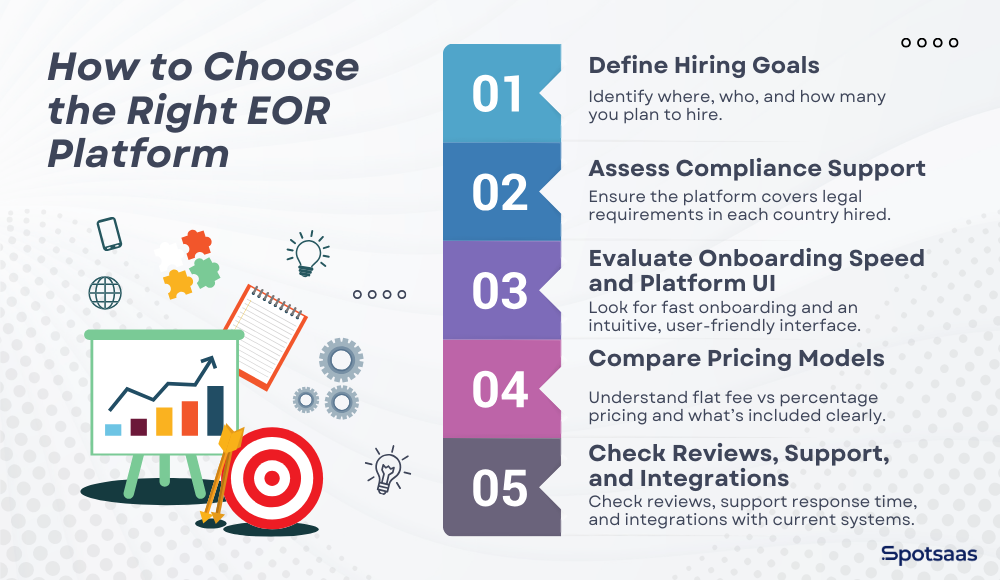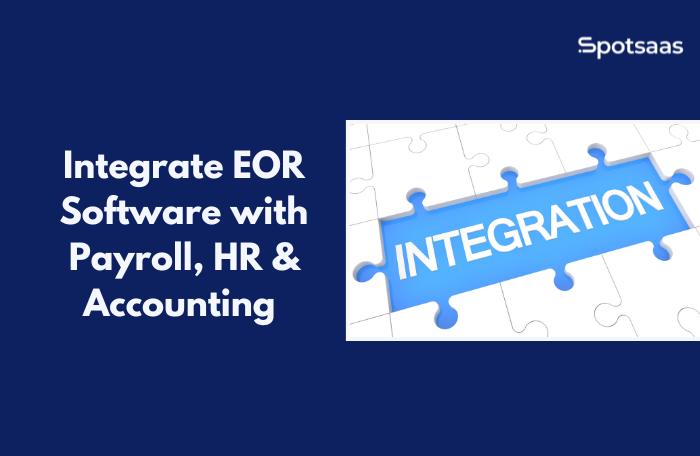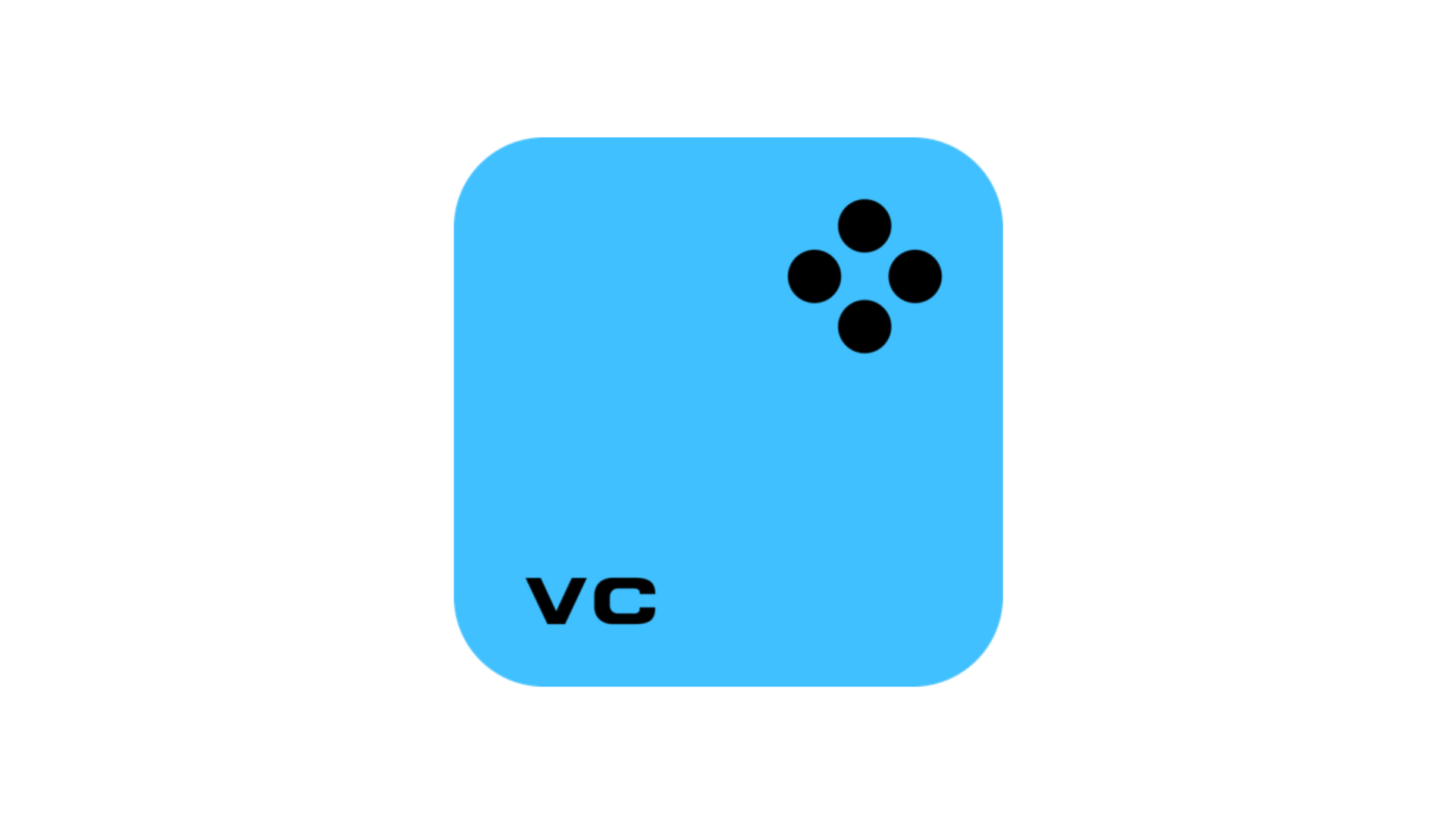EOR platforms are reshaping global hiring by giving businesses a faster, compliant way to build international teams. As remote work becomes the norm, companies of all sizes are tapping into global talent pools to fuel growth. Whether it’s a startup seeking specialized skills or a growing business entering new markets, global hiring is more accessible than ever.
Still, hiring across borders involves more than sending out an offer letter. Every country has its own tax codes, employment laws, and benefit requirements. Managing payroll, drafting region-specific contracts, and ensuring legal compliance can overwhelm internal teams.
That’s where an EOR platform adds value. It allows companies to legally employ talent in other countries without opening a local entity. From onboarding and payroll to compliance and benefits, EOR platforms handle the operational load so businesses can focus on scaling.
What This Blog Covers
This guide breaks down everything you need to know about Employer of Record (EOR) platforms, including:
- What an EOR is and how it works
- Common challenges in global hiring without one
- How EOR platforms simplify compliance, payroll, and onboarding
- Key features to look for when comparing platforms
- Who should consider using an EOR
- How to choose the right EOR provider for your business
What Is an Employer of Record (EOR)?
An Employer of Record (EOR) is a third-party service that takes on the legal responsibility of employing workers on behalf of a company. While the business still manages day-to-day tasks and sets work expectations, the EOR handles employment contracts, payroll, tax filings, and local compliance, allowing companies to hire internationally without opening a local branch or entity.
This model is often discussed in the context of EOR vs PEO. While both support HR and compliance, there’s a key difference: PEOs typically require the company to have a registered entity in the country where they plan to hire. EORs, on the other hand, already have legal entities in place, allowing businesses to onboard talent in new markets without local infrastructure.
Key Challenges in Global Hiring Without an EOR
Hiring internationally brings incredible opportunities, but it also introduces real operational complexity—especially if you’re managing it in-house. Companies often find themselves buried in compliance tasks that slow down their hiring goals without a partner that understands local laws and employment practices.
| Challenge | Summary |
|---|---|
| Local Labor Laws & Compliance | Each country has its own legal requirements that can be hard to navigate without local expertise. |
| Setting Up Legal Entities | Establishing entities abroad is costly, complex, and often unnecessary for small teams. |
| Payroll & Taxes | Multi-country payroll requires local tax knowledge and accurate statutory deductions. |
| Benefits & Contracts | Country-specific benefits and legally compliant contracts are difficult to create without localized insight. |
| Delays in Onboarding | Without proper infrastructure, onboarding new hires can take weeks or longer. |
Local Labor Laws and Compliance Obligations
Each country has its own rules around global hiring, firing, working hours, mandatory benefits, paid leave, and more. For example, in some countries, employers must contribute to national pension schemes, offer specific types of insurance, or follow detailed termination procedures.
Without the right legal knowledge, it becomes difficult to ensure full compliance—and the smallest oversight can lead to unexpected costs or delays.
Setting Up Legal Entities in New Countries
To legally employ someone in a new country, a company typically needs to establish a local legal entity. This process can take anywhere from a few weeks to several months and often includes working with government agencies, setting up local bank accounts, and hiring global legal counsel.
It’s a time-intensive effort that may not make sense if you’re only hiring a few team members in that region.
Managing Payroll and Taxes Across Borders
Running EOR payroll across multiple countries isn’t just about paying salaries in the correct currency. It involves understanding local tax codes, mandatory deductions, social security contributions, and end-of-year filings.
Missteps in payroll can affect employee satisfaction and create issues with local tax authorities—both of which are avoidable but time-consuming to manage internally.
Offering the Right Benefits and Drafting Local Contracts
Employees outside your home country will expect competitive and compliant benefits—health insurance, paid holidays, parental leave, and retirement contributions—based on what’s common in their local market.
Without access to country-specific data, it’s hard to know what’s legally required versus what’s considered standard. Similarly, employment contracts need to reflect the language, format, and legal terms of the employee’s location, not yours.
Delays in Onboarding and Scaling Operations
Even once you’ve figured out the legal and tax implications, it takes time to set everything in motion. Approvals, documentation, internal handoffs, and coordination with external legal or payroll partners can stretch onboarding timelines.
For fast-moving teams, these delays can impact product development, market expansion, or customer success.
How EOR Platforms Simplify These Challenges
Hiring across borders doesn’t have to be a logistical challenge. EOR platforms step in as strategic partners, handling the behind-the-scenes work so businesses can focus on building strong teams and delivering results. Here’s how they simplify the process across key areas:

Compliance Management
EOR platforms specialize in staying on top of local laws, tax codes, and employment regulations in each country they support. This includes managing mandatory benefits, public holiday policies, social contributions, and termination rules.
By outsourcing these compliance responsibilities to a provider with legal expertise, companies can reduce complexity while staying aligned with every region’s requirements.
Remote vs. Globalization Partners: Which EOR Platform Offers Better Compliance?
Entity Infrastructure
Setting up a legal entity in a foreign country can be expensive, time-consuming, and difficult to maintain. EOR platforms remove that barrier completely. Since they already operate legal entities in the countries they cover, businesses can hire employees abroad without creating a new company or navigating local bureaucracy.
This dramatically speeds up expansion and lowers operational overhead.
Payroll & Benefits
Coordinating payroll for employees in different countries involves understanding varying tax systems, payment cycles, currencies, and deductions. EOR platforms offer a centralized payroll engine that automates these processes.
Employees are paid accurately and on time, with statutory contributions handled in the background. On top of that, EORs provide access to locally competitive benefits packages—ensuring that new hires feel supported from day one.
Faster Onboarding
Once a candidate is selected, the EOR platform can onboard them in a matter of days—sometimes within 48 to 72 hours. The platform manages contracts, collects necessary documentation, and registers the employee in accordance with local regulations.
This speed gives growing teams the flexibility to ramp up quickly and respond to opportunities in new markets without delays.
Risk Reduction
One of the key advantages of using an EOR is that the legal liability for employment sits with the platform—not the hiring company. This means the EOR is responsible for ensuring local laws are followed, and they’re accountable for handling legal disputes, terminations, or audits.
It creates a layer of protection for businesses, particularly those hiring in unfamiliar regions.
Employee Support
International hires often need guidance on local labor practices, benefits enrollment, tax forms, and more. EOR platforms offer in-country support teams to help answer questions and provide clarity, improving the employee experience.
For companies without a dedicated HR presence in that region, this local support is a major advantage in keeping team members informed, engaged, and productive.
Who Should Use EOR Platforms?
EOR platforms aren’t just for large enterprises—they’re a valuable solution for a wide range of businesses that want to build global teams without added legal or operational burdens. Whether you’re expanding into emerging markets or hiring a remote team in another country, an EOR can make the process much smoother.
| 👥 Who | 💡 Why EOR Works for Them |
|---|---|
| 🚀 Startups | Hire global talent without entity setup or high overhead costs. |
| 📈 SMBs | Expand into new markets by hiring employees without permanent offices. |
| 🌍 Remote-First Teams | Stay compliant while building distributed teams across multiple countries. |
| 🌐 Market Testers | Explore new regions before fully committing to local operations. |
| 🏢 Enterprises | Quickly onboard contractors or teams in countries without infrastructure. |
Startups Hiring Their First Global Team Members
Early-stage companies often want to hire the best person for the job, no matter where they live. But the reality of setting up international legal structures to onboard a single employee isn’t practical—or budget-friendly.
EOR platforms help startups stay agile by enabling legal, compliant hiring without the traditional overhead. This makes it possible to scale a team globally while still staying lean.
Small and Mid-Sized Businesses Expanding Internationally
SMBs often start looking overseas once they’ve outgrown their home market or want to support international customers. An EOR acts as a launchpad—it allows them to establish a presence through people without having to set up a legal entity right away.
This is ideal for businesses looking to hire regional managers, sales reps, or support teams without committing to a full-blown expansion strategy.
Remote-First Companies
Companies that have remote work baked into their culture benefit greatly from EOR solutions. As they hire across different countries, staying compliant becomes difficult to manage in-house.
EOR platforms provide a consistent and reliable way to bring on remote employees legally, pay them accurately, and offer location-appropriate benefits—all while keeping operations centralized.
Businesses Entering New Markets Without Local Infrastructure
Sometimes, a company wants to explore a new region before fully committing. Instead of investing in a permanent office or subsidiary, they can use an EOR to hire sales, marketing, or support staff locally, learn more about the market, and scale based on early results.
EORs allow you to do this without needing to establish a legal business presence. It’s a lower-risk way to gather insights, assess demand, or support clients in a specific region—all while staying legally covered.
Enterprises Managing Contractors or Project-Based Teams Internationally
Even established businesses with internal HR and legal teams use EOR platforms when they need to move quickly or cover countries where they don’t already operate.
They’re especially useful when transitioning contractors into full-time employees or when launching short-term teams for projects in new territories.
Key Features to Look for in EOR Software
When evaluating EOR platforms, these must-have features make a real difference in ensuring compliance, efficiency, and a smooth hiring experience:
| Feature | Description |
|---|---|
| Multi-Country Support | Hire in multiple countries without setting up local entities. |
| Compliance & Payroll | Handles local taxes, labor laws, and accurate payroll delivery. |
| Onboarding Automation | Auto-generates contracts and collects documents for faster setup. |
| Localized Benefits | Offers country-specific benefits aligned with local expectations. |
| Centralized Dashboard | Manage contracts, payroll, and support from one platform. |
Multi-Country Hiring Support
A reliable EOR platform should support hiring across multi-countries through its own legal entities. This removes the need to set up a local business and lets companies onboard talent faster.
It also ensures that the hiring process aligns with the legal requirements of each country.
Local Compliance and Payroll Accuracy
The platform should handle local tax rules, social contributions, and labor laws while ensuring accurate, on-time payroll in the employee’s local currency. It should also take care of government reporting and year-end tax documentation.
This helps businesses avoid penalties and maintain trust with international employees.
Onboarding and Contract Automation
Look for tools that generate compliant employment contracts, collect documents digitally, and streamline the onboarding process from start to finish. Automated workflows reduce manual effort and help teams move quickly.
It also ensures consistency across global hires, no matter the location.
Benefits Administration by Country
Offering localized benefits—such as health insurance, leave entitlements, and pension options—is essential for employee satisfaction and legal compliance.
The platform should help structure country-specific packages that meet local standards. This makes your offer more competitive and supports long-term retention.
Centralized Platform for Admin and Support
A unified dashboard to manage employee records, contracts, payslips, and support tickets improves efficiency and transparency for both HR teams and employees.
Real-time visibility into onboarding status, payroll, and compliance simplifies team management. This also reduces reliance on scattered systems or manual tracking across borders.
How to Choose the Right EOR Platform
Not all EOR platforms are created equal. While many offer similar core services, their strengths vary across compliance depth, user experience, onboarding speed, and pricing. Here’s how to evaluate and choose the right EOR platform for your global hiring needs:

Define Hiring Goals: Countries, Employee Types, and Scale
Before exploring platforms, get clear on what you need. Are you hiring one or two employees in specific countries, or are you planning to build full teams across multiple regions?
Also, define the type of talent you’re bringing on—permanent employees, contractors, or hybrid roles—as some platforms are better suited for specific workforce models. Clarity on your goals will help you filter out providers that don’t align with your geographic coverage or hiring scale.
Assess Compliance Support in Target Markets
A strong EOR platform should bring deep compliance knowledge in every country you plan to hire. This includes handling contracts, statutory benefits, tax requirements, and local labor laws.
Check whether the provider owns its legal entities in those countries or relies on third-party partners—direct ownership often leads to smoother operations and faster onboarding. Ask if they provide legal updates and ongoing compliance monitoring, especially if labor laws change frequently in your chosen markets.
Evaluate Onboarding Speed and Platform UI
The onboarding experience matters—for both your HR team and your new hires. Look for platforms that offer fast turnaround on contracts, document collection, and activation of local benefits.
A clean, modern dashboard allows your internal team to manage global hires with less friction, track onboarding status, and access important documentation in one place. You can also explore how easily candidates can navigate their own onboarding journey—especially if self-service is important to your team culture.
Compare Pricing Models (Flat Fee vs. Percentage-Based)
EOR platforms typically charge either a fixed monthly fee per employee or a percentage of the employee’s salary. Flat fees are easier to forecast, especially if you’re hiring at scale or budgeting long-term.
On the other hand, percentage-based pricing might feel more flexible for smaller teams or short-term hires. Be sure to understand what’s included in the pricing—some platforms charge extra for benefits administration, offboarding, or payroll setup.
Check Customer Reviews, Support Quality, and Integrations
Dig into reviews from similar-sized companies or businesses in your industry. Pay attention to feedback around onboarding speed, customer service responsiveness, and billing clarity. Support is critical—especially when dealing with terminations, benefit disputes, or payroll questions in a different time zone.
Make sure you’ll have access to a dedicated account manager or 24/7 help if needed. Lastly, assess how well the platform can integrate EOR software with your current HR tools, payroll systems, or finance platforms to streamline operations and reduce duplication.
Conclusion
Employer of Record platforms have transformed how companies hire globally. What once required setting up legal entities, navigating country-specific regulations, and coordinating multiple vendors can now be managed through a single, reliable platform.
By simplifying compliance, handling payroll, and accelerating onboarding, EOR solutions reduce operational risk and free up teams to focus on growth. Whether you’re hiring your first international employee or expanding into multiple markets, the right EOR platform can speed up your plans and keep everything aligned with local laws.
If global hiring is on your radar, now is the time to explore your options. Compare leading EOR tools, review what each platform offers, and consider speaking with a provider to map out your next steps with clarity and confidence.
Frequently Asked Questions
What is an Employer of Record (EOR)?
An EOR is a third-party service that legally employs international workers on behalf of a company.
Do I need to set up a local entity to use an EOR?
No, EOR platforms let you hire globally without setting up a local legal entity.
How long does it take to onboard an employee through an EOR?
Most platforms can onboard employees within a few days after documentation is complete.
Is EOR the same as hiring a contractor?
No, EORs manage full-time employment with benefits and legal protections, unlike contractor agreements.
How much does an EOR platform typically cost?
Pricing usually ranges from a flat monthly fee to a percentage of the employee’s salary, depending on the provider.





